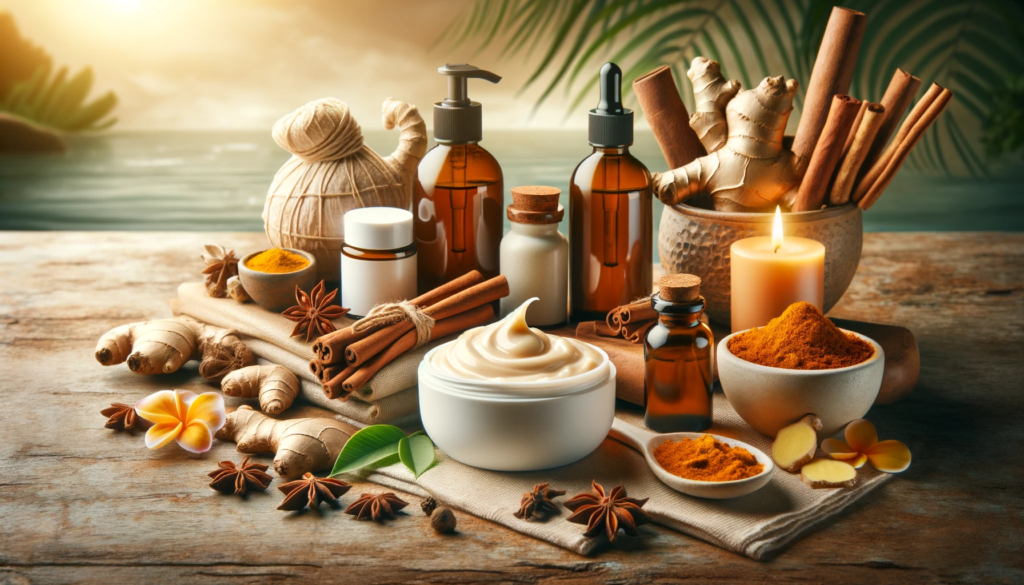Introduction to African Spices in Skin Care
Africa, a land renowned for its vibrant cultures and ancient traditions, also harbors an array of natural resources that extend far beyond its rich soils. Among these treasures lie the continent’s aromatic spices, coveted for their culinary uses and remarkable properties in skin care. Long appreciated by various African communities for their medicinal virtues, these spices have been seamlessly woven into daily beauty regimes, helping to nourish, heal, and protect the skin. Steeped in history and passed down through generations, using African spices in skin care stands as testament to a shared ancestral wisdom, offering profound natural alternatives for maintaining a radiant complexion. This burgeoning interest in traditional remedies has uncovered a trove of secrets intended not only for the palate but also for the palette of skin health and beauty practices.
Key African Spices for Natural Skin Care
Turmeric for Anti-Inflammatory Benefits
Turmeric, a spice revered in African tradition, holds a sacred place in culinary endeavors and the realm of beauty. The golden-hued spice is celebrated for its potent anti-inflammatory compound, curcumin, a powerful ally against skin irritation and inflammation. As an effective treatment for conditions like rosacea, eczema, and psoriasis, turmeric can soothe and diminish redness, creating a serene canvas upon which the skin’s natural luster is restored. Incorporating turmeric into homemade face masks or topical treatments can harness its soothing potential, ushering in a period of rejuvenation for stressed and delicate skin.
Cinnamon for Antimicrobial Properties
Cinnamon, much more than a holiday spice, is an illustrious member of the African spice bazaar. It is esteemed not only for its warming, sweet flavors but also for its profound antimicrobial prowess. Battling against bacteria and fungi, cinnamon acts as a vigilant guardian, warding off unwanted microbial guests that could otherwise blemish one’s complexion. The spice’s natural properties make it an excellent option for tackling acne, providing a gentle yet robust defense system. When infused into skincare formulations such as toners or spot treatments, cinnamon endows the skin with a refreshing calm and much-desired clarity.
Ginger for Skin Toning and Rejuvenation
Ginger is more than just a kick of spice in a flavorful dish; it’s a venerable ally in the battle for balanced and youthful skin. Heralded for its circulatory benefits, ginger sparks a warming sensation, enhancing the skin’s natural glow. Rich in antioxidants, ginger tackles age-inducing free radicals, promoting a rejuvenated appearance marked by diminished fine lines and restored elasticity. As a toning agent, it’s an exceptional inclusion in home-based skin routines, either as a grated addition to scrubs or as an extract in tonics, providing vigor and vitality to a tired epidermis.
Cardamom for Skin Detoxification
Cardamom is not just a staple in the spice rack for its fragrant touch in dishes but also holds a special place in the pantheon of African spices beneficial for skin detoxification. It contains impressive detoxifying properties which purge the skin of impurities and improve the complexion. The spice fosters a purifying process that sweeps away toxins, ensuring the skin breathes easily and radiates a healthy glow. Integrated into masks and exfoliants, cardamom can transform your skin care ritual, leaving your skin feeling invigorated and pure.
Cloves for Acne Treatment and Prevention
Cloves are nature’s pungent jewels, often visualized tucked into warm beverages or savory meats, yet their role in skin care, specifically in acne treatment and prevention, is less commonly acknowledged. Packed with eugenol, a chemical compound known for its antiseptic properties, cloves offer an organic solution to the persistent challenge of acne. Extensively valued in African traditional remedies, the antibacterial potency of cloves has made it a coveted addition to natural skincare concoctions, effective in battling against impurity-induced breakouts and paving the way towards a clear and unblemished visage.

Creating Natural Skin Care Treatments with African Spices
DIY Spice-Based Face Masks and Scrubs
Embracing the alchemy of African spices, one can create powerful DIY skin treatments that cater to a range of skin concerns. The art of crafting homemade face masks and scrubs imbued with these spices is not just an act of self-care but an homage to ancestral beauty rituals. By mixing the likes of turmeric, cinnamon, and ginger with natural bases such as honey, yogurt, or clay, enthusiasts can concoct potent blends that nourish and revitalize the skin, evoking the continent’s timeless essence within the confines of one’s own home.
How to Prepare and Apply Homemade Spice Treatments
Beginning the preparation of homemade spice treatments involves uniting carefully measured spices with complementary ingredients to form pastes or mixtures suitable for application on the skin. The process respects the delicate balance required to derive the spices’ benefits and maintain skin harmony. Once the treatment is prepared, smooth application in a gentle, circular motion ensures the active ingredients thoroughly penetrate the skin. It’s paramount to follow each session with a gentle rinse and to apply a moisturizer to lock in the spices’ enriching properties, allowing the natural actives to work their wonders.

The Science Behind African Spices and Skin Health
Understanding the Active Compounds in Spices
Diving into the core of African spices reveals a complex network of active compounds responsible for their skin-enhancing attributes. Compounds such as curcumin in turmeric, cinnamaldehyde in cinnamon, and gingerol in ginger, are but a few examples of the bioactive ingredients that promote skin health. These compounds are known for their antioxidant, anti-inflammatory, antiseptic, and detoxifying properties, acting on the cellular level to provide their various protective and restorative benefits. An insightful understanding of how these elements synergize on the skin is what makes incorporating spices into skincare routines not just a tradition but a science-backed approach to beauty.
Research and Studies on Spice Efficacy in Skin Care
Scientific studies and meticulous research have begun to add empirical weight to the long-held beliefs regarding the efficacy of spices in skin care. With a growing body of evidence, researchers continue to unveil the specifics of how these spices counteract various skin issues. Clinical trials and laboratory tests reveal the depth of potential locked within each granule, whether turmeric can diminish the impact of photoaging or cinnamon’s role in battling pathogen-induced skin conditions. This burgeoning understanding empowers users to make informed choices in incorporating African spices into beauty rituals.
Tips for Integrating African Spices into Your Skin Care Routine
Safe Usage and Allergy Considerations
As with any introduction of natural elements into skincare, safe usage and allergy considerations are paramount. Not all skin types react identically to spices; some may be sensitive or allergic to certain compounds. Thus, performing patch tests prior to full application is advised to ensure compatibility. Additionally, spices should be used in moderation. They should be properly researched or discussed with a dermatologist if there is any concern regarding their interaction with the skin or existing conditions. These simple steps safeguard against potential adverse reactions while allowing the skin to benefit from the potent properties of African spices.
Customizing Treatments for Different Skin Types
Each individual’s skin is as distinctive as their fingerprint, necessitating a tailored approach when incorporating African spices into a skin care regimen. Understanding the specific needs of one’s skin type is essential to creating a harmonious blend of spices and other elements. For example, oilier skin may benefit from the astringent properties of cinnamon, whereas sensitive skin might favor the soothing effect of turmeric. Mastery of these nuances allows for the creation of personalized treatments, ensuring that the natural power of African spices is harnessed in the most effective way possible.
Combining Traditional Wisdom with Modern Skin Care
Balancing Natural Remedies with Contemporary Products
The synthesis of traditional African spice wisdom with contemporary skin care has the potential to revolutionize beauty routines. While natural remedies offer a profound connection to the earth and its bounty, modern dermatological advances provide precision and consistency. Finding the equilibrium between the two can lead to an optimized skin care approach, one that embraces the best of both worlds. Integrating spice-infused treatments with scientifically-formulated products can establish a regimen that is both rooted in the rich soils of tradition and tailored to the individualistic needs of modern skin care.
The Holistic Benefits of African Spices in Beauty
Embracing a Wholistic Approach to Beauty and Wellness
The use of African spices in beauty extends far beyond the surface; it embodies a holistic perspective on wellness. Recognizing the interconnectedness of body, mind, and spirit within the beauty routine allows for a nurturing and comprehensive approach to self-care. The spices serve not only the skin but also cater to the senses, offering aromatic tranquility and a moment of reflection amid the bustle of daily life. In embracing the entirety of their benefits, one transforms the simple act of skin care into a practice of contemplation and reverence for the self and the natural world.
FAQs on African Spices in Skin Care
What Are the Benefits of Using African Spices in My Skin Care Routine?
African spices offer a treasure trove of benefits for your skin care routine. These natural ingredients are rich in antioxidants and anti-inflammatory properties that help combat oxidative stress and soothe irritated skin. They can also possess antimicrobial and antiseptic properties, valuable in treating and preventing skin infections and acne. Incorporating spices like turmeric, ginger, and cinnamon into your regimen can promote a more even skin tone, improved texture, and a healthy glow.
How Can I Safely Test African Spices for Skin Sensitivity?
When experimenting with new ingredients like African spices, it’s crucial to conduct a patch test to avoid potential allergic reactions or irritations. To do this, apply a small amount of the spice-infused product to a discreet area of skin, such as the inner forearm. Monitor the area for 24-48 hours for any signs of redness, itching, or swelling. If no adverse reaction occurs, you can safely incorporate the spice into your skincare routine.
Can African Spices Be Used on All Skin Types?
African spices can be beneficial for a variety of skin types when used correctly. However, it’s essential to customize the use of these spices to your specific skin concerns and type. For instance, some spices may be too potent for very sensitive skin or may need to be diluted. People with dry skin may benefit from spices mixed with hydrating bases, whereas those with oily skin might look for formulations that help to balance oil production without over-drying.
How Often Should I Use Spice-Infused Products in My Skin Care Regimen?
The frequency of use for spice-infused skin care products depends on your personal skin tolerance and the specific spice being used. Generally, mild formulations can be used several times a week, while more intense treatments may be best limited to once a week or bi-weekly use. Always start with a conservative approach to measure how your skin adapts, and gradually increase usage as your skin becomes accustomed to the spice-infused product.
Are There Any Specific African Spices Proven to Be Effective for Anti-Aging?
Several African spices have shown promise in the realm of anti-aging. For example, turmeric has curcumin, which is known for its potent antioxidant properties that can help reduce visible signs of aging by protecting the skin from free radical damage. Cinnamon is praised for promoting collagen synthesis, which can lead to firmer and more youthful-looking skin. Again, individual results can vary, and continuous research and personal testing will yield the best outcomes for anti-aging benefits.
What Should I Mix with African Spices to Create DIY Skin Care Treatments?
When creating DIY skin care treatments with African spices, it’s critical to mix them with ingredients that complement their properties and cater to your skin’s needs. For instance, mixing turmeric with yogurt or honey can create a soothing and hydrating face mask. Cinnamon pairs well with oatmeal for an exfoliating and anti-inflammatory scrub. It is also important to consider carrier oils like coconut or almond oil when working with more potent spices to avoid irritation and to facilitate easier application.
